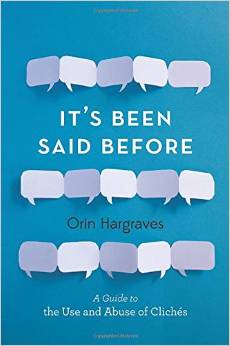To generally avoid them, yes, but to totally retire and consign them to the shadows of language? Definitely not!
Unorthodox maybe, but from the frontlines of the war against clichés, that’s how American lexicographer Orin Hargraves views them in his book
It’s Been Said Before: A Guide to the Use and Abuse of Clichés (Oxford University Press, 248 pages). It’s not a snap subjective judgment but one borne out by Hargraves’s work in modern computational lexicography, with which he had painstakingly gathered statistical evidence on the actual usage of words and phrases—their frequency, combinations, users, and usage situations. His verdict? “It is often misapplication, rather than frequency of application, that leads to the perception of a phrase as a cliché.”

Hargraves admits that he had originally intended to put many old and tired clichés out of their misery by naming and shaming them, even using “The Graveyard of Dire Clichés” as working title for his book. In the end, however, the linguistic evidence made him realize that most clichés will never die. “All speakers find them extremely useful to smooth the steady flow of speech,” he concedes. “Many, perhaps most, writers must resort to cliché from time to time in order to connect with their readers in a way that formal language, often barren of clichés, does not allow them to do.”
Read Joseph Epstein’s review of Orin Hargraves It’s Been Said Before in WeeklyStandard.com now!ABOUT THE AUTHOR:Orin Hargraves is a lexicographer and writer of language reference books. A past president of the Dictionary Society of North America, he has contributed to dozens of dictionaries and other language reference books. He does research on the computational use of language at the University of Colorado at Boulder.
RELATED READING:In “What the World Will Speak in 2115,” an article that came out in the January 2, 2015 issue of
The Wall Street Journal, American linguist John H. McWhorter allays as “premature” fears that English will become the world’s only language a century from now. He says: “Few are so pessimistic as to suppose that there will not continue to be a multiplicity of nations and cultures on our planet and, along with them, various languages besides English… But the days when English shared the planet with thousands of other languages are numbered. A traveler to the future, a century from now, is likely to notice two things about the language landscape of Earth. One, there will be vastly fewer languages. Two, languages will often be less complicated than they are today—especially in how they are spoken as opposed to how they are written.”
Read John H. McWhorter’s “What the World Will Speak in 2115” in WallStreetJournal.com now!ANOTHER INTERESTING READING:In “From ‘mankind’ to ‘mansplain,’ the descent of ‘man’,” an article that came out in the January 11, 2015 issue of the
Boston Globe, correspondent Britt Peterson weighs in on the plan of the New York City Metropolitan Transit Authority’s plan to combat the scourge of “manspreading,” the growing practice of men to take up multiple subway seats with their spread-eagled legs. Peterson argues that this form of linguistic weaponry known as “gender marking” merely rights a balance that has been tipped massively in favor of men for centuries. “The very reason these words are so unexpected and satisfying (for women, at least) is that they do to male words what English has done to female words for as long as people have been speaking the language,” she says.
Read Britt Peterson’s “From ‘mankind’ to ‘mansplain,’ the descent of ‘man’,” in BostonGlobe.com now!